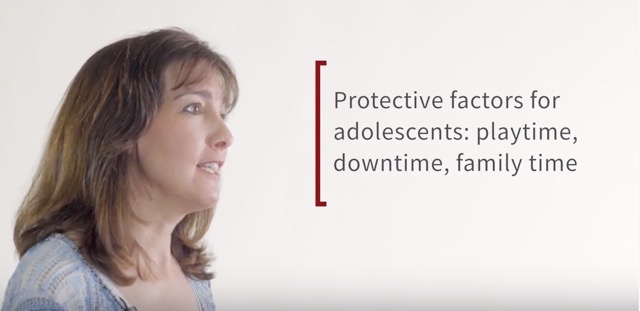Welcome to our special section, Thrive on Campus, devoted to covering the urgent issue of mental health among college and university students from all angles. If you are a college student, we invite you to apply to be an Editor-at-Large, or to simply contribute (please tag your pieces ThriveOnCampus). We welcome faculty, clinicians, and graduates to contribute as well. Read more here.
When I talk to students from high-performing schools across the country on the topic of student balance and well-being, I often ask them to reflect on how they define success. Many students answer in the same way: money, admission to a prestigious college, high grades and test scores. They believe this very narrow view of success defines their lives, and they often feel like they have to sacrifice their health and happiness to reach these goals.
Data from student surveys we administer at Challenge Success, a nonprofit research and advocacy organization I co-founded at Stanford University, clearly show that this narrow notion of success is taking its toll. In our recent survey of 43,000 students from high-performing schools, 75% of high school students and 50% of middle school students reported “often or always feeling stressed” by their schoolwork, while more than two-thirds of high-schoolers reported being “often or always worried” about getting into the college of their choice. Students also reported sleep deprivation, headaches, stomach problems, and missing school and other activities due to overwhelming stress. Other research shows that adolescents under academic achievement pressure have high levels of anxiety, depression, and suicide ideation — so much so that recent reports have classified students from high-achieving communities as an “at-risk” population similar to those living in poverty and foster care. While some stress is necessary and good for healthy adolescent development, we know that an undue amount of pressure placed on kids at school, home, or via peers can be detrimental to their well-being.
The good news is that the undue stress these kids are facing is preventable. Challenge Success partners with schools across the U.S. to support changes such as adjusting the student schedule to allow for later start times and longer block periods, reducing homework load without sacrificing rigor, and creating a climate of care through initiatives like advisory and wellness campaigns that can increase students’ sense of belonging and healthy coping strategies.
But the schools alone cannot make all the changes necessary to improve student health; parents must play their part as well.
One mantra I often share with parents is the importance of PDF — which stands for Playtime, Downtime, and Family time. Research on protective factors for teens shows that engaging in PDF every day can support better mental and physical health. Playtime for teens means unstructured time for social interactions and playing informal sports, games, and other activities for fun. Structured extracurricular activities are great and can lead to positive development, but kids also need time for unstructured play, as well as downtime where they can relax and rejuvenate, and time with family — approximately 20 minutes per day, five times a week — where they are eating together or participating in family activities such as game nights or service projects. Protecting PDF for kids isn’t easy, but we know that it is effective.
Here are three actions to take immediately to help support teens to get the PDF they need:
1) Prioritize Sleep
According to experts, adolescents need 8-10 hours of sleep per night. There’s extensive research about the connection between sleep and learning, memory, emotional regulation, and physical well-being. To support sleep, limit caffeine and late-night activity, take all devices out of the bedroom at night, and enforce a strict bedtime routine.
2) Support a healthy and balanced schedule
Challenge Success offers two time management tools — a Time Management worksheet and a Time Wheel activity to help students see how much time they are spending on homework, extracurriculars, paid work, community service, family time, and social media. Use the tools to check for a healthy balance. Teens might need to limit the number of advanced classes they take, reduce media use, or drop an activity to make time for sleep and PDF.
3) Broaden your definition of success
Success is measured over the course of a lifetime, not at the end of a semester. Consider how your words and actions communicate your values. For example, if the first question asked at the end of the day is “How did you do on the history test?” you may be sending a signal that you care more about grades than anything else in your teen’s life. Be sure to praise kindness, effort, curiosity, and authenticity, and try hard not to micromanage your teen’s academic life. By over-focusing on grades or performance, you may be perpetuating the narrow view of success that the kids describe above.
Though it may not be possible to control the intense achievement pressure that comes from such a narrow definition of success, parents who commit to making these three actions a part of their family routine can help make positive shifts in health and well-being and prevent more teens from becoming “at-risk.”
Subscribe here for all the latest news on how you can keep Thriving.
More on Mental Health on Campus:
What Campus Mental Health Centers Are Doing to Keep Up With Student Need
If You’re a Student Who’s Struggling With Mental Health, These 7 Tips Will Help
The Hidden Stress of RAs in the Student Mental Health Crisis


